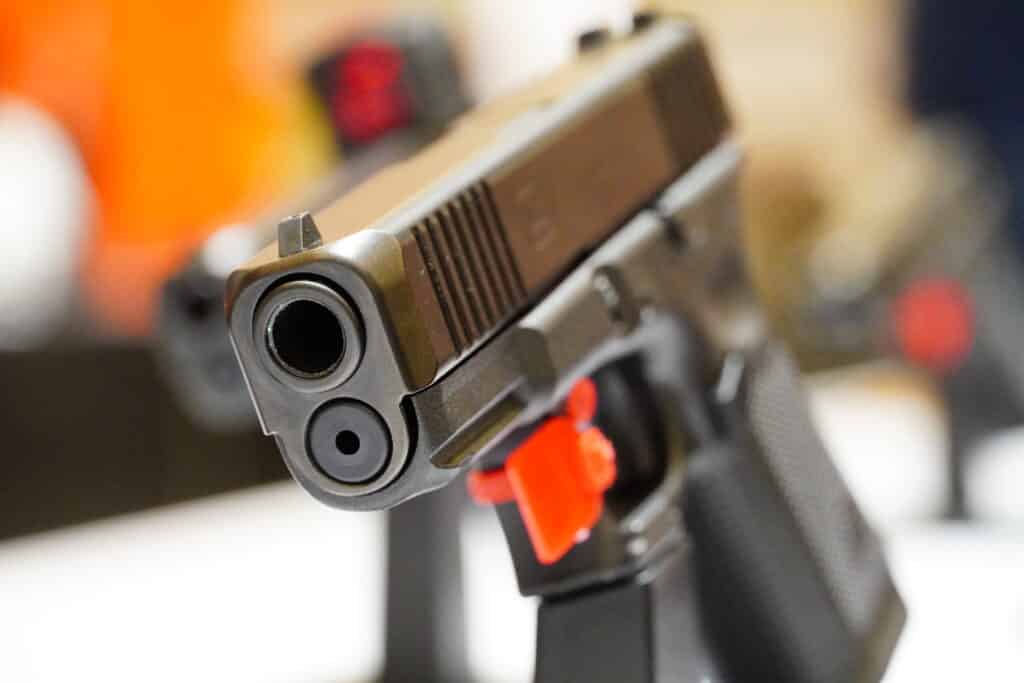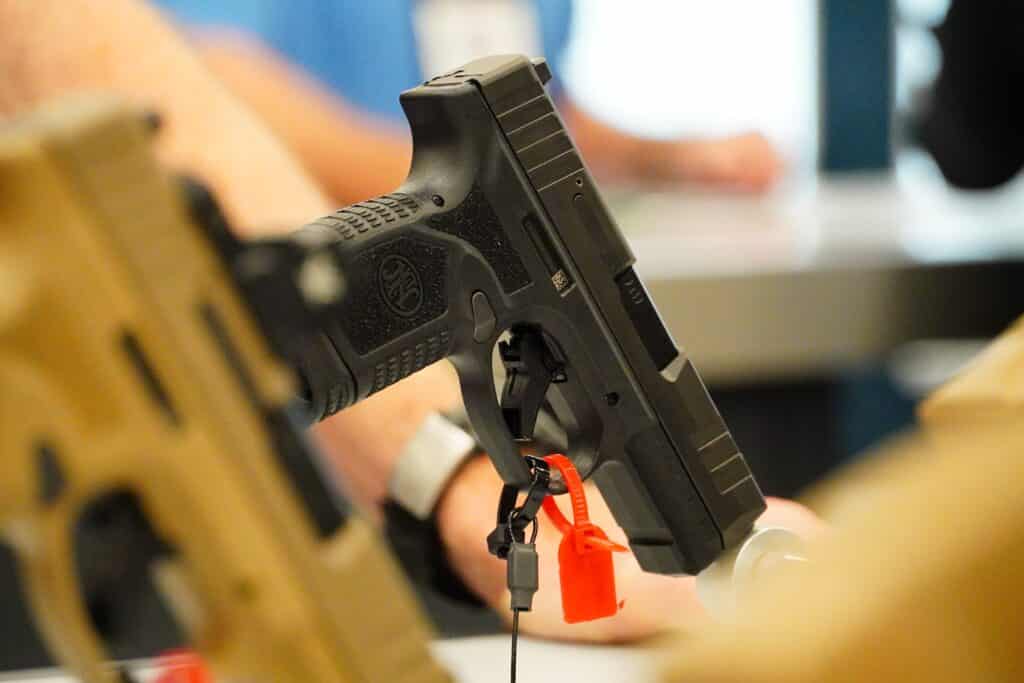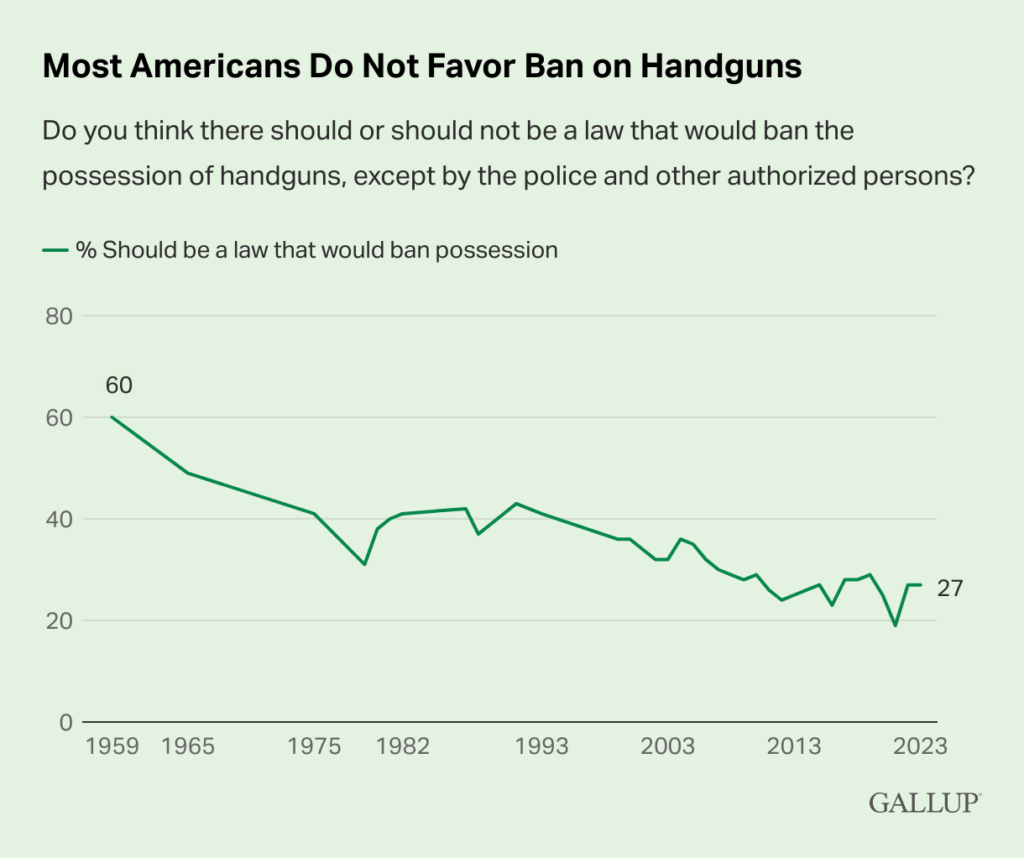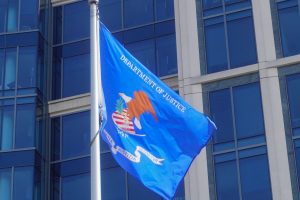We’re leading this week’s members’ newsletter with something I never thought we’d see. The ACLU just asked the Supreme Court to strike down a federal gun ban because it violates the Second Amendment.
The group may be dedicated to civil liberties but has traditionally left gun rights to other groups. If anything, it has been actively supportive of further gun restrictions–increasingly so in recent years. Those who’ve followed the legal battle over guns since Bruen will recognize many of the ACLU’s arguments, but it’s still surprising to see them coming from what’s long been a left-leaning organization.
Contributing Writer Jake Foglemen dives into the ACLU’s brief and breaks down what it’s arguing.
We also broke a major story about Kamala Harris’s gun-control record. In 2005, she was one of only a few San Francisco officials to back a total ban on handguns. That could have a substantial impact on what’s proving to be another close election, much like a story I broke about Hillary Clinton’s opposition to the Supreme Court’s landmark Second Amendment decision. But that’ll only happen if persuadable voters hear about it, which I explain is probably going to be an uphill battle for the Trump Campaign and the NRA.
Plus, we have the lawyer who defeated the handgun ban Harris backed on the podcast.

Analysis: ACLU Goes to Bat for Non-Violent Felon Gun Rights [Member Exclusive]
By Jake Fogleman
The American Civil Liberties Union (ALCU) has a long track record of supporting various gun control laws despite its traditionally oppositional stance to government restrictions on constitutional rights. However, the group has now found at least one gun law it thinks violates the Second Amendment.
On Tuesday, the ACLU and several of its state chapters filed an amicus brief with the Ninth Circuit Court of Appeals in United States v. Duarte. The brief asks the en banc court to reaffirm a since-vacated panel ruling from May that sided with defendant Steven Duarte and overturned his conviction for possessing a firearm after prior convictions for drug possession and vandalism. The group argued that a blanket lifetime ban on felons owning guns violates the Second Amendment.
“The Supreme Court has held that, to override the Second Amendment’s protection, the government must show that its regulation is consistent with the historical principles underpinning our founding-era tradition of restricting firearms,” the ACLU’s brief reads. “Because the government has failed to point to any such support for permanently disarming every person convicted of an offense punishable by more than one year, this Court should uphold Mr. Duarte’s as-applied challenge to section 922(g)(1).”
The filing stands out as one of the few times the ACLU has gone on record arguing that an existing gun law is unconstitutional. It places the progressive group alongside the National Rifle Association, Firearms Policy Coalition, and the libertarian-leaning Cato Institute in filing briefs against the federal non-violent felon gun ban.
The ACLU’s brief took an expansive view of who counts among “the people” covered by the text of the Second Amendment. It dismissed the Government’s position that only “responsible, law-abiding citizens” count, calling it “extreme” and an argument foreclosed by the Court’s United States v. Rahimi decision.
“As the Court held there, the Second Amendment’s protections are not limited to ‘responsible’ or ‘law-abiding’ citizens,” the group wrote. “That interpretation is consistent with how the phrase ‘the people’ is used in other Bill of Rights provisions, none of which exclude people with felony convictions—much less persons deemed not ‘responsible, law-abiding citizens.'”
The ACLU then turned to the historical record. It noted that the government is unable to identify “any founding-era laws [that] specifically prohibited people with felony convictions from possessing guns—let alone those who committed any offense, including nonviolent and nondangerous offenses, punishable by more than one year in prison.”
“It instead invokes two other categories of 18th-century laws: (1) laws authorizing capital punishment for people convicted of felonies; and (2) laws categorically disarming certain groups, including Catholics, Black people, and Native Americans,” the group wrote.
The group cautioned The Court against accepting the argument that because nearly all people convicted of felonies at the Founding could be punished with death, they could also be permanently disarmed. It noted that far fewer crimes were classified as felonies during the Founding. It also said that the ability to execute convicted felons says nothing about what was permissible for those who were not executed and instead returned to society.
“The principle the government draws from these laws cannot be that, where capital punishment is authorized, all other penalties— including those that permanently deny constitutional rights—are also permissible,” the ACLU wrote. “If it did, then nothing would stop the government from stripping a person with felony convictions of, for example, their right to free speech, or any other constitutional rights. That is obviously not the law.”
The ACLU chastised the government’s citation of bigoted status-based bans on moral and legal grounds.
“As an initial matter, the obvious invalidity of denying people rights based on their race or religion should bar reliance on these examples altogether,” the group wrote. “Moreover, the principle that the government seeks to draw from these laws—that Congress can impose generalized categorical prohibitions on possessing firearms—is at far too high a level of generality to be acceptable.”
Instead, it noted that none of the bigoted laws cited by the government were permanent or premised on prior convictions and that most offered persons subject to them a way to regain their arms rights through different avenues. It contrasted the government’s reliance on such laws with the argument accepted by the Supreme Court in support of the domestic violence restraining order gun ban in its June Rahimi decision.
“Rahimi placed great weight on the fact that 18 U.S.C. § 922(g)(8) ‘s prohibition is ‘temporary’—in Mr. Rahimi’s case, it was just ‘one to two years after his release from prison’—and predicated on an individualized determination that the person poses a specific threat to others,” the ACLU wrote. “The permanent nature of section 922(g)(1) ‘s ban, unconnected to dangerousness, is thus further reason to conclude that the statute, as applied to Mr. Duarte, is inconsistent with historical principles.”
Finally, beyond the constitutional arguments surrounding the felony gun ban, the ACLU also drew attention to more practical concerns. It noted that the statute “encompasses an extraordinarily broad range of predicate offenses” that capture non-violent crimes far more often than violent ones. It cited court data showing only 18.2 percent of felony convictions in state courts and 4.2 percent of federal felony convictions were for violent offenses. Meanwhile, the lifetime ban applies to all felons regardless of violent status, and it even extends to state misdemeanors punishable by more than a year in jail.
The group also emphasized the way the prohibition has produced “racially disparate harms,” particularly for black Americans.
“Nearly 60 percent of people convicted under section 922(g) in 2023 were Black,” the group wrote. “As a result of these convictions, ‘nearly a quarter of Black adults have been permanently stripped of the right to lawfully possess firearms.'”
In turn, the group argued these statistics help fuel “disparate law enforcement practices” like stop-and-frisk policies by police departments looking to crack down on illegal gun possession.
“To be sure, these racial harms do not bear directly on the Second Amendment analysis at issue,” the ACLU concluded. “But they are an important reminder that ‘[t]he very purpose of a Bill of Rights was to withdraw certain subjects from the vicissitudes of political controversy, to place them beyond the reach of majorities and officials.'”
Overall, the brief reads like it could have come from any number of gun-rights groups challenging the federal felony gun ban alongside public defender’s offices across the country over the last couple of years. Unsurprisingly, it has already drawn plaudits from some gun-rights advocates. Alan Gottlieb of the Second Amendment Foundation called it “a stunningly detailed amicus brief” and said it marked “a remarkable and refreshing approach” by the organization.
Whichever way it goes, the Duarte case may not be the last word on firearms rights for non-violent felons. After all, lawsuits against the felony gun ban have been the most common Second Amendment challenge since the Supreme Court set a new standard for reviewing gun laws in 2022’s Bruen. However, arguments backing Duarte could prove more persuasive coming from the ACLU in a progressive-leaning court like the Ninth Circuit. If that court sides with the ACLU, it would further deepen the existing federal circuit split over the felon-in-possession ban and give the Supreme Court even more of a reason to take the issue up.
The Court has already been under immense pressure from the Department of Justice and gun-rights activists alike to do just that. While it opted to kick the can down the road earlier this year by granting, vacating, and remanding many of those requests, several have already been returned by their respective circuits with unchanged outcomes.
Given that Duarte will soon be one more of those cases sitting on The Court’s doorstep and that the Court’s majority is already trending toward making “dangerousness” its standard for disarmament, it would not be surprising to see the ACLU’s arguments echoed in a Supreme Court majority opinion in the near future.
Podcast: California Gun-Rights Lawyer on 20 Years of Fighting Kamala Harris in Court [Member Early Access]
By Stephen Gutowski
This week, we broke a major story about Kamala Harris’s record backing a total handgun ban in San Francisco.
As District Attorney in 2005, Harris supported Proposition H. It banned the sale, purchase, and even possession of pistols by nearly every city resident. The measure never went into effect, but only because gun-rights activists won the court fight over it before that could happen.
Chuck Michel, President of the California Rifle and Pistol Association, was the lawyer who won that case. He joined the podcast to discuss both the fight over Proposition H and the numerous other fights over gun restrictions he had with Harris during her time in California. He argued her support for several strictest-in-the-nation gun measures is more reflective of how she would govern as president than her recent remarks on owning a handgun herself.
You can listen to the show on your favorite podcasting app or by clicking here. Video of the episode is available on our YouTube channel. An auto-generated transcript is here. Reload Members get access on Sunday, as always. Everyone else can listen on Monday.
A free 30-day trial of The Dispatch is available here.
Plus, Contributing writer Jake Fogleman and I talk about what bearing Harris’s past support for a handgun ban might have in the current election. We also talk about new FEC records showing the NRA trailing the national gun rights groups in political fundraising by millions of dollars in August. Finally, we wrap up by talking about the record drop in murder in 2023 and the rise of gun ownership among self-identified liberals.

Analysis: Harris’s Previous Support for Handgun Confiscation Raises Questions, Could Sway Election [Member Exclusive]
By Stephen Gutowski
Kamala Harris backed a total ban on handguns early in her career, which complicates her campaign’s message on guns and maybe even the trajectory of the race.
On Tuesday, we reported that Harris supported Proposition H in 2005 as San Francisco’s District Attorney. The measure would have barred nearly all city residents from selling, buying, or possessing pistols had it not been struck down by multiple California courts. Her support for it opens up a slew of yet-to-be-answered questions for the candidate and the presidential race.
Before this week, Harris and Donald Trump alike had settled into what seemed to be their final gun messaging headed into November. Trump has downplayed the issue while chiding gun owners for not voting in big enough numbers and attacking Harris for wanting to take people’s guns. Harris has responded by pointing to her own gun ownership as evidence she won’t take anyone’s guns and just wants to ban the sale of assault weapons, require universal background checks, and implement “red flag” laws.
“She has a plan to confiscate everybody’s gun,” Trump said during this month’s debate.
“This business about taking everyone’s guns away; Tim Walz and I are both gun owners,” Harris responded a few minutes later. “We’re not taking anyone’s guns away.”
While many, including Oprah, were surprised to hear Harris say she owned a gun during the debate, she had talked about it once before.
“I am a gun owner, and I own a gun for probably the reason a lot of people do – for personal safety,” she said during an April 2019 event. “I was a career prosecutor.”
A Harris aide told CNN at the time that Harris’s gun was a pistol, and she’d had it for years at that point.
So, if that’s the case, when did she buy her pistol? Did she own it when she backed Proposition H?
If she did own a handgun in 2005, did she plan to turn it in? Or did she believe she’d be covered by the active-duty law enforcement exception? If she bought her gun later, why did she buy a handgun after seeking to ban them? Why not buy a shotgun or rifle instead?
Also, when did she change her mind about taking away people’s handguns? Why did she change her mind?
And, most importantly for the 2024 race, will any of this matter?
Handgun bans were already unpopular in 2005, which is likely why other prominent gun-control advocates shied away from Proposition H. The Supreme Court officially ruled Washington, DC’s handgun ban unconstitutional just three years later, shortly after a California appeals court rejected the San Francisco ban. Gallup’s polling shows they have become increasingly unpopular since then, with just 27 percent of Americans backing one in 2023.
In 2016, I reported on audio from a Hillary Clinton fundraiser where she said the Supreme Court was wrong in striking down DC’s ban. That story broke at a similar time in that race.
The NRA ended up pouring tens of millions of dollars into ads attacking Clinton for those comments. She lost, and in a race as close as 2016 was, it’s difficult to conclude that the story didn’t have a significant impact on the outcome–especially in more pro-gun states like Pennsylvania and Arizona.
2024 is shaping up to be yet another close race. Donald Trump has many vulnerabilities like he did back then, including that he’s the first candidate prohibited from owning guns to win a major party nomination, but he has a real chance of winning the presidency like he did back then. This story presents nearly the same problem for Harris, perhaps even a bigger one, than the 2016 story did for Clinton.
So, it could be one of those major stories that shake up the race.
But there are also reasons to think it won’t be. For one, Harris has already faced controversy over her past support for confiscating some guns and is actively trying to assuage concerns over that. Whether she’s doing enough by just stating she won’t take people’s guns is a very open question, but she’s still doing more than Clinton ever did to respond.
Voters have also consistently ranked guns as a mid-to-bottom-tier issue in this race. Despite the stark contrast in approaches by the candidates and a recently high-profile school shooting, polls show voters have kept their attention on other issues like the economy or defending democracy.
Additionally, the NRA is in no shape to flood the airwaves with ads highlighting her support for Proposition H. It’ll be a harder lift than the Clinton ads anyway since video of her commenting on the ban has yet to surface. But the NRA just doesn’t have anywhere near the funds to spend on ads against Harris as it did against Clinton.
But this story doesn’t need to change a million minds to swing the election. The margins in each swing are unlikely to add up to anywhere near that. So, the bar is significantly lower than that. Whether Harris ignoring the story can keep it out of those voters’ minds or Trump and the NRA can get them to focus on it could make the difference.
That’s it for now.
I’ll talk to you all again soon.
Thanks,
Stephen Gutowski
Founder
The Reload









Only Members can view comments. Become a member today to join the conversation.